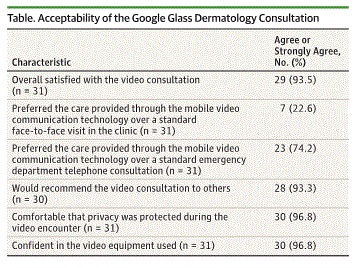 Patients are overwhelmingly satisfied with dermatology consults via Google Glass, even preferring them to consultations over the phone, according to a feasibility study recently published in JAMA dermatology. MobiHealthNews wrote about the study last year when Rhode Island Hospital first began to investigate Google Glass, working with Glass startup Pristine.
Patients are overwhelmingly satisfied with dermatology consults via Google Glass, even preferring them to consultations over the phone, according to a feasibility study recently published in JAMA dermatology. MobiHealthNews wrote about the study last year when Rhode Island Hospital first began to investigate Google Glass, working with Glass startup Pristine.
The study was conducted on emergency room patients who presented with a rash or other skin condition. Normally, those patients would get a dermatology consult by phone, with a picture of the affected skin emailed to the consulting dermatologist in some cases. The 31 patients who completed consultations in the study went through that standard procedure, but also had a second consult with an emergency room physician wearing Google Glass, who could stream images directly to the specialist.
Twenty-nine of the patients (93.5 percent) were satisfied overall with the procedure and 30 (96.8 percent) were confident in both the accuracy of the video equipment and the privacy of their information. Twenty-eight people said they would recommend the Google Glass consultation to others.
Only 7 participants said they liked the experience more than they would have enjoyed a simple face to face consultation with the specialist, but in many areas setting up a specialist visit can take weeks. And 23 of the 31 patients in the study said they preferred the consultation to the standard of care (the phone call and e-mailed photo).
Kaiser Health News points out that Glass is both cheaper than traditional telemedicine carts and easier to maneuver through a busy ER environment, making it an attractive technological option for emergency departments.
In an interview with MobiHealthNews last year, Dr. Paul Porter, one of the investigators in the study, said that HIPAA-compliance was one of the biggest challenges in designing the intervention, but it was achieved eventually by stripping down the software to essentials and encrypting the two-way data stream.
"It’s every CIO’s worst nightmare to have a breach or have video uploaded on YouTube,” he said at the time. “We know other facilities within New England had looked at Glass and given up, just not having found a solution to that technical problem, as far as encryption goes. We really put a lot of time in trying to get the best possible conditions for confidentiality, picking a specialty that we thought would be the safest for the patients. In our study, [the Google Glass consultation is] over and above the standard of care, which is a phone call plus or minus a snapshot.”













